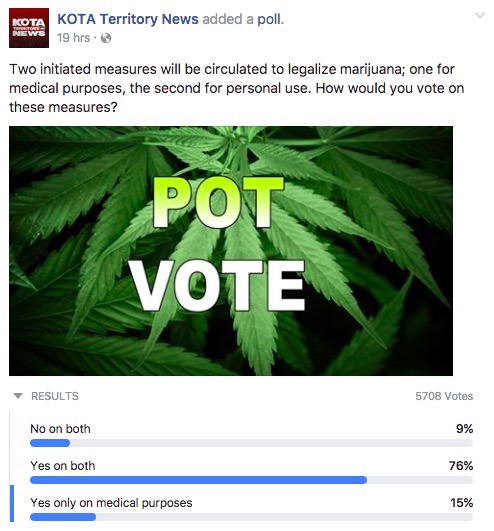With Attorney General Marty Jackley releasing his slanted explanations for New Approach South Dakota’s ballot measures on medical and recreational cannabis, KOTA-TV runs a poll on Facebook asking voters how they would vote on the two measures.

If Shantel Krebs can look at 98 people clicking on an Aberdeen American News poll and call the 61% swinging her way a “commanding lead” for herself, then the new Approach ballot questioneers should be able to look at 5,700+ people giving recreational pot 76% approval and medical cannabis 91% approval and shout “Game over, Marty!” the moment they submit their completed petitions this fall.
So we know how the Facebook crowd will vote… assuming the Facebook crowd realizes that real action requires voting, not just clicking.
Capitalizing on that favorable sentiment will be crucial to New Approach’s movement, since Attorney General Jackley has crafted his “objective, clear, and simple summary” not so much to “educate the voters of the purpose and effect of the initiatives,” as required by statute, as to deter them from legalizing medical and recreational cannabis.
Jackley’s explanation of the medical cannabis initiative is almost identical to the explanation he issued for the almost identical 2015 measure that New Approach failed to get on the ballot. A.G. Jackley adds just two words to the first line: instead of “The measure,” he opens with “This 95-section measure….” We all know that when Republicans don’t want us to support a plan, they moan, “Oh, it’s so long!” (Cue Michael Scott….)
Jackley’s explanation of the recreational cannabis initiative does much more to sandbag the measure. First, despite his statutory mandate to provide a concise title (when statute demands “concise”, it’s o.k. to complain about length), Jackley ignores New Approach’s more concise 14-word title (“An Act to provide for the regulation and taxation of cannabis and cannabis products”) and goes for 23: “An initiated measure to legalize certain amounts of marijuana, drugs made from marijuana, and drug paraphernalia, and to regulate and tax marijuana establishments.”
The recreational cannabis initiative refers to allowing possession of “cannabis paraphernalia”; Jackley says the initiative legalizes “drug paraphernalia.” The initiative refers to cannabis and cannabis products; Jackley says the initiative legalizes “trafficking”—a loaded word—”certain amounts of marijuana or some kinds of controlled substances.” The later overly broad term invites voters to speculate that this cannabis initiative legalizes totally different kinds of drugs—meth! crack! peyote! Dogs and cats living together!
Jackley works in mention at the end that the recreational cannabis initiative has 35 sections. He asserts that “the acts described in the measure would remain illegal under State or Federal law.” I can buy Federal, but how can an initiative that becomes State law leave the actions it describes illegal under State law?
Jackley then closes by saying the measure has “numerous conflicts with other State laws”—which one would think are dealt with by the Section 2 phrase Notwithstanding any other law—”and within the measure itself” and “A court may find portions of the measure unconstitutional.”
Given that courts may find portions of any measure unconstitutional, it seems uninstructive to add that legal opinion to any ballot question explanation. A.G. Jackley didn’t use it in 2016 on Referred Law 19, a measure that raised clear Constitutional concerns but which his fellow Republicans supported. 2016’s Amendment S, the crime victims’ bill of rights, raises Constitutional concerns about due process and presumption of innocence, but since Amendment S was sponsored by a GOP consultant (and now Marty’s campaign manager), Jackley avoided the word “unconstitutional” and instead just said that “a court may determine that the defendant’s rights take priority.” But when Marty’s party doesn’t want anything related to marijuana passed, Jackley is far more inclined to stamp a ballot measure “unconstitutional.”
Jackley’s sandbags may not be that heavy. If KOTA’s online poll gives any inkling of public sentiment, New Approach simply needs to tap existing enthusiasm for reforming marijuana laws to get the word out. Advertise like crazy, and people won’t even look at the Attorney General’s explanation on the ballot; they’ll just look for the numbers (IM 24 and 25?) that they’ve heard in every ad and Facebook Share from their friends and mark Yes and Yes.
I predict South Dakota to be one of the last states to relent to the will of the people regarding marijuana. We have a history of elected officials disregarding both common sense and the will of the people.
Once the kids with seizures go away, Jackley will make sure the rest of us suffer from his imaginary morality.
Unfortunately, clicking on a poll is not the same as voting. That’s why we have a state government full of people stuck in 1950 – only Grandma and Grandpa and the Baptist family with 12 kids are voting, it seems. I agree that SD will likely be one of the last states to change its marijuana laws, and only after the federal government does so. Please prove me wrong!
In other evidence that Marty may have to work harder to beat these cannabis initiatives, New Approach SD organizer Melissa Mentele makes Leafly’s list of eight influential women leading the cannabis industry. Is Marty getting any national press like that?
Never say never. The economic benefits are hard to ignore. Neighboring states such as North Dakota and Montana have already legalized medical cannabis. South Dakota desperately needs the money. It would be stupid not to legalize.